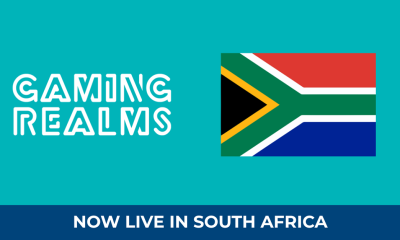Compliance Updates
EGBA Welcomes Plans for Overhaul of Finland’s Online Gambling Monopoly

The Ministry of the Interior in Finland has announced a legislative project to reform the country’s gambling monopoly system by introducing a license system for online gambling, including casino games and betting activities. EGBA, representing Europe’s leading online gambling companies, has welcomed this announcement as a crucial milestone in addressing the shortcomings of Finland’s outdated monopoly framework for online gambling.
The legislative project aims to draft necessary proposals for the reformation of the gambling system. These proposals will cover various aspects, including the gambling activities to be included in the license system, license fees, taxation, safer gambling rules, prevention of gambling-related harm, and advertising regulation. The project will run until 31 December 2025 and aims to conclude with a legislative proposal in spring 2025.
Finland is the only EU member state still operating an exclusive monopoly regime for all online gambling activities. However, the effectiveness of this system has drawn increasing public scrutiny due to Finnish gamblers migrating to international websites that offer them greater choice and more competitive betting odds compared to the monopoly. As a result, Finland has faced a loss of significant taxable revenues from online gambling, diminished control over its online gambling market, and Finnish players utilising gambling websites that are not subject to Finnish laws.
Maarten Haijer, Secretary General of EGBA, said: “This is a welcome step towards meaningful and overdue gambling reform in Finland. The introduction of multi-licensing would provide greater choice and safeguards to Finnish consumers, ensure fairer competition between operators, and enable the Finnish authorities to have greater control over their online gambling market. With these changes of the Finnish legislation, all member states of the EU will now have some form of licensing regime for online gambling. We look forward to continuing dialogue with the Finnish Government and local stakeholders as the regulatory discussions develop.”
Brevard County Sheriff Wayne Ivey
Florida: Attorney General James Uthmeier Announces Seizure of Over 500 Gambling Machines in Large-Scale, Multi-County Illegal Gaming Crackdown

Florida Attorney General James Uthmeier announced the results of a two-day sting operation targeting illegal gaming operations. The operation spanned Volusia, Brevard, Duval, and Flagler counties, resulting in the seizure of 525 illegal machines and $190,000 in illicit proceeds across 39 locations, according to preliminary operation results.
“Unlawful gambling operations often play a role as the financial backing behind criminal networks. These illegal casinos fuel organized crime, prostitution, and other illicit activities. Florida will see a major statewide crackdown on illegal gaming in 2026. If you’re running an illegal operation, don’t roll the dice; shut it down now,” said Attorney General James Uthmeier.
“The partnerships we have with the Attorney General, Florida Gaming Control Commission and surrounding law enforcement agencies are what give us great results. They help us keep our crime down in our communities and keep our citizens safe, because we don’t turn a blind eye to any crime,” said Brevard County Sheriff Wayne Ivey.
“These unregulated machines rarely pay out because they are set for the house to win. Illegal gambling is not a victimless crime. Often, it fuels other crime and preys on residents who are often elderly and on a limited income in the hopes of a big win,” said Flagler County Sheriff Rick Staly.
“This successful operation sends a clear message that organized criminal activity has no place in Florida. I’m grateful for the strong partnership between our agency, the Attorney General’s Office, and our regional law enforcement partners because by working together, we’ve made Duval County and the State of Florida a safer place,” said Jacksonville Sheriff T.K. Waters.
“The operators and slumlord property owners who prop up these unregulated, illegal casinos are ripping off our residents and costing them their savings. These casinos are connected to money laundering, drug smuggling and human trafficking. We will keep taking them down with our partners like the Attorney General and the Gaming Control Commission, but we really need further action from the Legislature to address this problem statewide,” said Volusia County Sheriff Michael Chitwood.
“The Florida Gaming Control Commission (FGCC) is thankful to Governor Ron DeSantis, Attorney General James Uthmeier, the Florida Legislature, and our law enforcement partners for these outstanding results. Thank you for this wonderful teamwork. These actions are protecting Floridians from predators who mislead unsuspecting citizens. True collaboration is key to a significant outcome such as today,” said Florida Gaming Control Commission Chair Julie Brown.
This was a joint operation by the Gaming Control Commission, the Office of Statewide Prosecution, Volusia County Sheriff’s Office, Flagler County Sheriff’s Office, Brevard County Sheriff’s Office, and Jacksonville Sheriff’s Office.
Machines were seized from restaurants, bars, gas stations, sham arcades, and standalone illegal casinos—some unmarked and some masquerading as other businesses such as nail salons and beauty supply stores. Law enforcement seizures included stand-up slot machines, PC slot machines, tabletop machines, coin-push machines, and fish table machines.
This operation advances Attorney General Uthmeier’s 2026 priority of executing a statewide crackdown on illegal gaming operations. The Attorney General has urged the Florida Legislature to enact reforms to increase the penalty for keeping a gambling house to a felony.
The post Florida: Attorney General James Uthmeier Announces Seizure of Over 500 Gambling Machines in Large-Scale, Multi-County Illegal Gaming Crackdown appeared first on Americas iGaming & Sports Betting News.
Compliance Updates
Romanian Mayors Push to Ban Gambling Halls

A wave of Romanian mayors has followed the example set by Slatina’s mayor, who recently announced plans to eliminate gambling halls from his city under newly amended legislation. While the political signal is growing louder, the decisive vote belongs to local councils – and gambling operators are unlikely to retreat without resistance.
On February 26, the mayor of Vaslui, Lucian Braniște (PSD), said he would submit a draft decision to the Local Council seeking a ban on gambling halls within the city. He argued that gambling has become a serious social issue across many Romanian communities.
“In recent years, gambling has become a real problem in many communities in Romania. Beyond advertisements and colorful lights, behind these halls, there are too often stories of affected families, debts, addiction, and suffering,” the mayor said.
In Ploiești, mayor Mihai Polițeanu also voiced support for eliminating gambling venues and announced that he would table a similar proposal before the City Council, Economedia.ro reported. He described parts of the city centre as having turned into a “strange, underworld-like” area, suggesting that the proliferation of betting shops has contributed to urban degradation.
The mayors of Brăila and Rădăuți have likewise declared their intention to pursue restrictions on gambling activities.
The initiatives follow a recent amendment to gambling legislation adopted by the government, which now requires operators to obtain not only a national licence but also a local authorisation from the mayor’s office in the municipality, town, or commune where they operate. The new provision also empowers local councils to decide whether such activities may take place within their administrative boundaries.
While the political momentum appears to be building, the outcome will ultimately depend on council votes in each locality. Given the economic stakes and the industry’s established presence, legal and political battles are expected before any city can formally declare itself gambling-free.
The post Romanian Mayors Push to Ban Gambling Halls appeared first on Eastern European Gaming | Global iGaming & Tech Intelligence Hub.
Compliance Updates
Crypto.com Receives Limited Financial Institutions Licence in Europe

Crypto.com has announced another regulatory milestone: its EU MiCA regulated entity has received a Limited Financial Institutions licence from the Malta Financial Services Authority (MFSA). The approval allows the company to continue delivering its full suite of stablecoin services – qualifying as payment services – across the European Union, without disruption.
This additional licence is for the provision of services exclusively in relation to electronic money tokens (EMTs). The licence was acquired to navigate a complex regulatory landscape resulting in overlapping crypto asset services (MiCA) and payment services (PSD2). By securing the Limited Financial Institution Licence, Crypto.com has addressed both regulatory regimes ensuring full compliance across every aspect of its stablecoin operations.
Crypto.com’s Malta entity received MiCA approval in January 2025, allowing the company to passport services across the European Economic Area (EEA). Notably, Crypto.com already holds a full Electronic Money Institution (EMI) licence in Europe, making it one of the most comprehensively authorised platforms operating in the region.
“We are one of the most regulated crypto platforms in the world and receiving this licence proves, yet again, that we are committed to working with authorities to ensure the strongest compliance standards. Our stablecoin business and services remain a pivotal part of our European product offering so it was vital we secured this limited licence to continue providing seamless access to our institutional and retail customers,” said Eric Anziani, President and Chief Operating Officer at Crypto.com.
The limited Financial Institutions licence adds to Crypto.com’s expanding list of licences and registrations globally including, but not limited to, a UK Electronic Money Institution licence (FCA), a Major Payment Institution licence in Singapore (MAS), a Virtual Assets Service Provider licence in Dubai (VARA), U.S. Money Transmitter Licences, U.S. Designated Contracts Market (DCM) & Derivatives Clearing Organization (DCO) licences and recently conditional approval from the U.S. OCC for a National Trust Bank Charter.
The post Crypto.com Receives Limited Financial Institutions Licence in Europe appeared first on Eastern European Gaming | Global iGaming & Tech Intelligence Hub.
-

 iGaming6 days ago
iGaming6 days agoPRAGMATIC PLAY UNEARTHS PROGRESSIVE MULTIPLIERS IN ROLLING IN TREASURES
-

 Comatel5 days ago
Comatel5 days agoCOMATEL CELEBRARÁ UNA FIESTA PARA CIENTOS DE OPERADORES TRAS FINALIZAR EL PRIMER DÍA DE LA FERIA ESPAÑOLA, INTERAZAR
-

 Booming Games6 days ago
Booming Games6 days agoBooming Games Introduces Instastrike, the Latest Diamond Hits Trio
-

 ELA Games6 days ago
ELA Games6 days agoELA Games Powers the Reels with Retro-Electric Slot “Rapid Wild”
-

 Africa6 days ago
Africa6 days agoGaming Realms Makes South African Debut in Partnership with Hollywoodbets
-

 Alex Green Vice President Games at ZEAL6 days ago
Alex Green Vice President Games at ZEAL6 days agoWunderino Adds ZEAL’s Premium Slots as Partnership Kicks Off
-

 Blueprint Gaming6 days ago
Blueprint Gaming6 days agoNew collect modifiers and dual bonus offering star in Blueprint Gaming’s King Kong™ Splash
-

 Brasil6 days ago
Brasil6 days agoBrasil evita choque fiscal y apuestas entran en fase reputacional en LATAM































